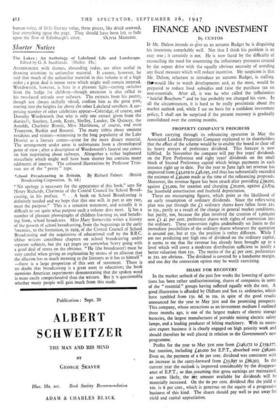FINANCE AND INVESTMENT
By CUSTOS
IF Mr. Dalton intends to give us an autumn Budget he is disguising his intentions remarkably well. Not that I think his problem is an easy one ; it certainly is not. He is now faced by the difficulty of reconciling the need for countering the inflationary pressures created by the export drive with the equally obvious necessity of avoiding any fiscal measure which will reduce incentive. My suspicion is that Mr. Dalton, reluctant to introduce an autumn Budget, is stalling. 14111.would like to watch developments and, at the most, would be prepared to reduce food subsidies and raise the purchase tax on non-essentials. After all, it was he who called the inflationists " baleful Bourbons " and he has probably not changed his view. In all the circumstances, it is hard to be really pessimistic about the market outlook and, while I see no basis for a confident investment policy, I shall not be surprised if the present recovery is gradually consolidated over the coming months.
PROPERTY COMPANY'S PROGRESS When carrying through its refinancing operation in May the Associated London Properties Company explained to its shareholders that the effect of the scheme would be to enable the board to clear off its heavy arrears of preference dividend. This forecast is now fulfilled. In November the company will pay five years' dividends on the First Preference and eight years' dividends on the small block of Second Preference capital which brings payments in each instance right up to date. For the year to June 24th net revenue has improved from £43,019 to £48,195, and thus has substantially exceeded the estimate of L40,000 made at the time of the refinancing proposals. Moreover, the revenue figure has been struck after providing L39,000, against L35,000, for taxation and charging £20,000, against £2,834, . for leasehold amortisation and freehold depreciation.
These are encouraging figures, which point to the likelihood of an early resumption of ordinary dividends. Since the refinancing plan was put through the Li ordinary shares have fallen from ars. to 15s., partly as a result of the change in general market conditions, but partly, too, because the plan involved the creation of t,000,oba new Li 41- per cent. preference shares with rights of conversion into the ordinary. These conversion rights undoubtedly set limits to the immediate possibilities of the ordinary shares whenever the quotation is around par, but at 15s. the position is rather different. While I am not predicting any high rate of dividend on the ordinary capital, it seems to me that the revenue has already been brought up to a level which will cover a moderate distribution sufficient to justify a better valuation than 15s. The merits of the 41 per cent. preferences at 2is. are obvious. The dividend is covered by a handsome margin, and one day the conversion option may be worth exercising.
SHARE FOR RECOVERY In the market setback' f the past few weeks the lowering of quota- tions has been rather undiscriminating, shares of companies in some of the " essential" groups having suffered equally with the rest. A good illustration is afforded by Oldham and Son is. ordinaries, which have tumbled from 13s. 6d. to ios. in spite of the good results announced for the year to May 31st and the promising prospects. This company, whose attractions as an investment medium I outlined three months ago, is one of the largest makers of electric storage batteries, the largest manufacturer of portable mining electric safety lamps, and a leading producer of felting machinery. With its exten- sive export business it is clearly engaged on high priority work and should therefore be well placed in relation to the Government's new programme.
Profits for the year to May 31st rose from £146,172 to £159,177, but taxation, including £40,000 for E.P.T., absorbed over £98,000. Even so, the payment of a 6o per cent. dividend was consistent with an increase in the carry-forward from £55,897 to £66,303. In the current year the outlook is improved considerably by the disappear- ance of E.P.T., so that assuming that gross earnings are maintained, as seems likely, the :lit amount available for dividends will be materially increased. On the 6o per cent. dividend Ate the yield at los. is 6 per cent., which is generous on the equity of a progressive business of this kind. The shares should pay well to put away for yield and capital appreciation.


































 Previous page
Previous page